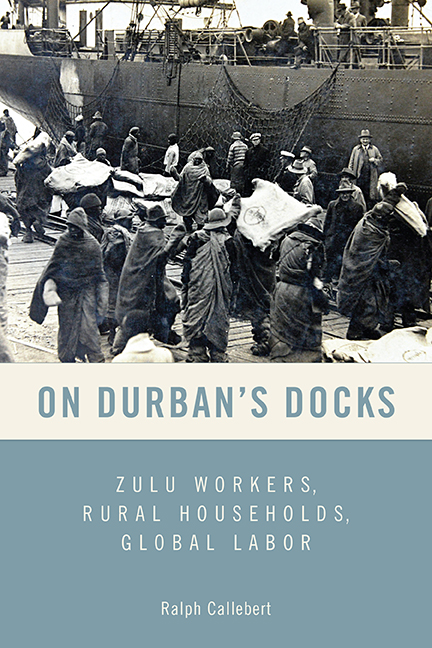Book contents
- Frontmatter
- Dedication
- Contents
- List of Maps
- Acknowledgments
- Abbreviations
- Introduction: Dock Workers in South African History
- 1 Dock Workers and the City, 1910s to 1950s
- 2 One Head of Cattle Named Salt, Another Named Beans: Livelihood Strategies in the 1950s
- 3 Work and Life between the City and the Countryside
- 4 My Children Never Went to Bed Hungry: Gender, Households, and Reproductive Labor
- 5 Cleaning the Wharves: Pilferage, Bribery, and Informal Trade
- 6 Buffaloes on Noah’s Ark: Reimagining Working-Class History
- Conclusion: Durban’s Dock Workers in Global Perspective
- Epilogue
- Notes
- Glossary
- Bibliography
- Index
4 - My Children Never Went to Bed Hungry: Gender, Households, and Reproductive Labor
Published online by Cambridge University Press: 29 May 2021
- Frontmatter
- Dedication
- Contents
- List of Maps
- Acknowledgments
- Abbreviations
- Introduction: Dock Workers in South African History
- 1 Dock Workers and the City, 1910s to 1950s
- 2 One Head of Cattle Named Salt, Another Named Beans: Livelihood Strategies in the 1950s
- 3 Work and Life between the City and the Countryside
- 4 My Children Never Went to Bed Hungry: Gender, Households, and Reproductive Labor
- 5 Cleaning the Wharves: Pilferage, Bribery, and Informal Trade
- 6 Buffaloes on Noah’s Ark: Reimagining Working-Class History
- Conclusion: Durban’s Dock Workers in Global Perspective
- Epilogue
- Notes
- Glossary
- Bibliography
- Index
Summary
Two Phewa households reside across a little valley from each other near Izingolweni, about twenty-five miles inland from Port Shepstone (see map 1.1) along the N2 highway. One household consists of Banelisiwe, Thembeni, and some of their grandchildren; in the other household Florence and Matha live, also with a few grandchildren. Banelisiwe, Florence, and Matha are the late Nsizwana Phewa's daughters; Banelisiwe from his first wife, Florence and Matha from his second wife. Thembeni is Banelisiwe's sister-in-law; she was married to Nsizwana's eldest son, who has also passed away. Both Nsizwana, who was born in 1909, and Thembeni's husband worked on the Durban docks for many years.
These women remember the 1950s and 1960s as a time when life was easier and better. They worked hard, collecting water and firewood, working on the fields, cooking and cleaning, but they were never short of anything and had little need for money. Now, however, one needs money for everything, they complained, and their grandchildren struggle to find jobs. The two households used to live together in one big homestead, and Nsizwana's two wives regularly cooked together. Their children played together as well. Banelisiwe and Thembeni, who belonged to the house of the senior wife, remember both houses being equal and their mothers getting along well. According to Florence and Matha, however, the senior house was somewhat better off; they did agree that there was little discord between their mothers. The Phewas grew some beans, maize, sweet potatoes, amadumbe (taro), and other crops, and raised cattle, goats, and poultry. Nsizwana would come home about every three months but also regularly sent home samp and flour. The little bit of cash they needed was mostly used for clothes. Only Banelisiwe received one year of schooling. She was taught by a white lady from overseas, but people used to think that education was not important for girls. Education, people used to say, would make women “too smart for [their] own good.”
Dock labor in Durban and small-scale commercial activities, whether or not supported by pilferage, were crucial to the survival and reproduction of these households. However, women and youth in Izingolweni and other rural locations performed the actual labor of reproduction—that is, the work performed in the private sphere that sustains and reproduces the household: cooking, cleaning, raising children, and so on.
- Type
- Chapter
- Information
- On Durban's DocksZulu Workers, Rural Households, Global Labor, pp. 86 - 109Publisher: Boydell & BrewerPrint publication year: 2018



